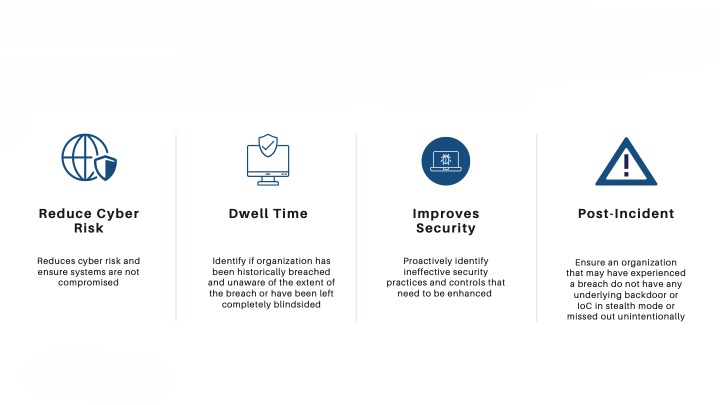Compromise assessment is essentially a comprehensive health check for your organization’s cybersecurity defenses. It’s like bringing in a team of expert detectives to comb through every digital corner of your network, looking for any signs of trouble or unauthorized access. This meticulous process involves scrutinizing network traffic, logs, and system configurations to detect any abnormal activities or potential breaches that may have slipped past your security measures.
The goal of a compromise assessment is to catch security compromises early on before they can cause significant damage. By identifying and addressing vulnerabilities or breaches promptly, organizations can minimize the impact of cyber threats and prevent potential data breaches or financial losses. Ultimately, a compromise assessment is a proactive step towards enhancing overall cybersecurity resilience, helping organizations stay one step ahead of cybercriminals and safeguarding sensitive information and assets.
Data Collection: We start by gathering information from a variety of sources, including logs, network traffic data, and system activity reports. This comprehensive data collection ensures that we have a thorough understanding of your organization’s digital environment.
Analysis: Our team meticulously examines the collected data, looking for any anomalies or suspicious patterns that could indicate a compromise. This detailed analysis allows us to pinpoint potential security threats and vulnerabilities.
Incident Reconstruction: We reconstruct the sequence of events leading up to the potential compromise. This helps us understand how the compromise occurred and what actions were taken by the attackers, providing valuable insights for remediation.
Forensic Investigation: Conducting an in-depth forensic analysis is crucial for gathering evidence and determining the extent of the compromise. Our experts thoroughly investigate compromised systems and data to identify any signs of unauthorized access or malicious activity.
Remediation: Once the compromise has been identified, we take swift action to contain it. This may involve removing any malicious software or unauthorized access and implementing robust security measures to prevent future incidents.
Reporting: Finally, we document our findings in a detailed report. This report includes information about the compromise, its impact on your organization, and recommendations for improving security. Our goal is to provide you with actionable insights to strengthen your cybersecurity defenses and protect your sensitive data.

GRC360 offers a spectrum of both technical and non-technical assessments tailored to suit the specific needs of organizations. These assessments delve deep into various aspects of cybersecurity, including network infrastructure, system configurations, and employee awareness. By conducting these assessments, GRC360 helps organizations identify and quantify potential risks associated with cyber-attacks. This proactive approach allows organizations to prioritize their security efforts and allocate resources effectively to mitigate identified risks.
GRC360 equips organizations with robust Incident Response Plans (IRPs) designed to swiftly and effectively respond to cyber-attacks. These plans outline detailed procedures and protocols to follow in the event of a security breach, ensuring a coordinated and timely response. Additionally, GRC360’s Breach Response Services provide organizations with expert assistance in mitigating the damage caused by a breach. From containment strategies to data recovery efforts, GRC360’s team of cybersecurity professionals offers support at every stage of the incident response process, helping organizations minimize the impact of security incidents on their operations and reputation.
GRC360 acts as a trusted partner, offering organizations access to expert advice and resources to navigate the complex landscape of cybersecurity. Whether it’s staying abreast of emerging threats, implementing best practices, or enhancing security posture, GRC360’s team of seasoned professionals provides tailored guidance to address organizations’ unique challenges and objectives. Additionally, GRC360 offers training programs and workshops to empower employees with the knowledge and skills needed to identify and respond to potential security threats effectively. By leveraging GRC360’s expertise and resources, organizations can effectively manage their risk landscape and safeguard their systems and data against cyber threats.
© All rights reserved@GRC360